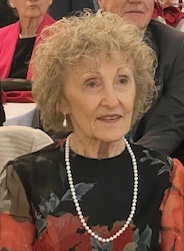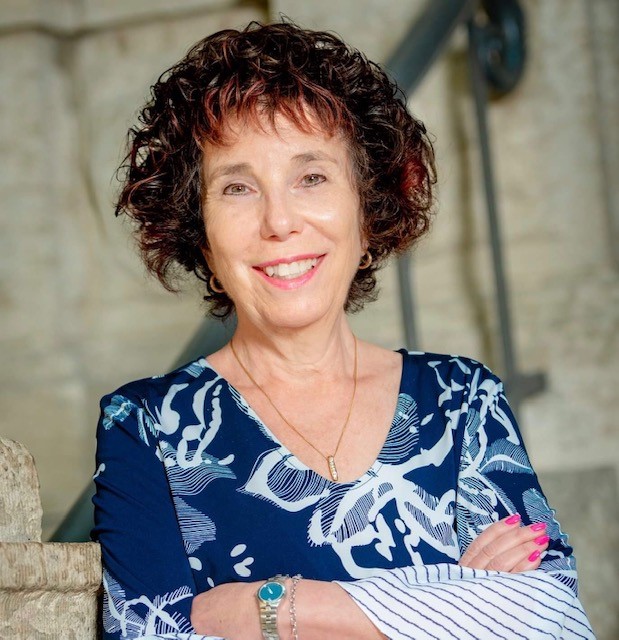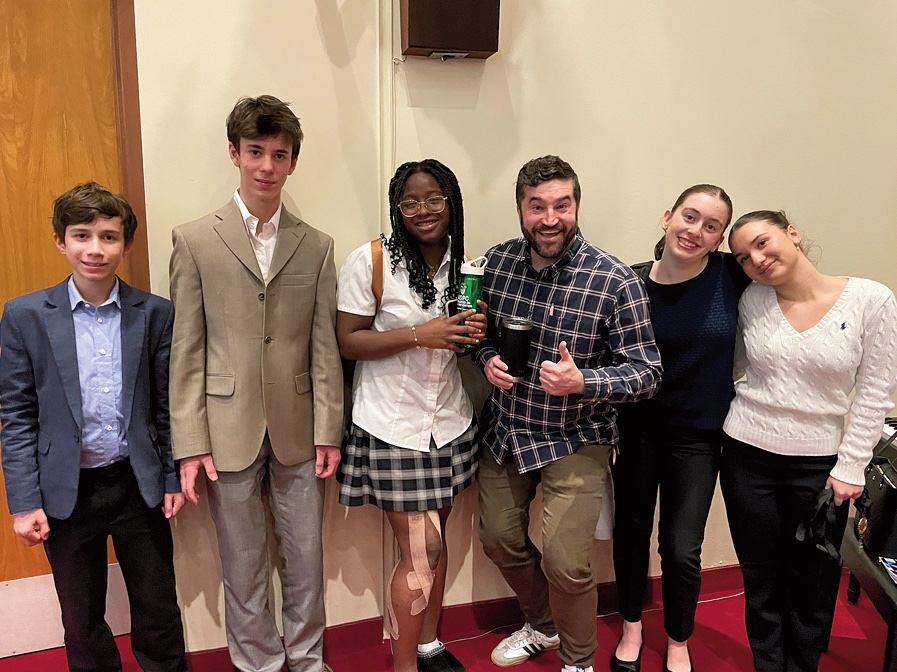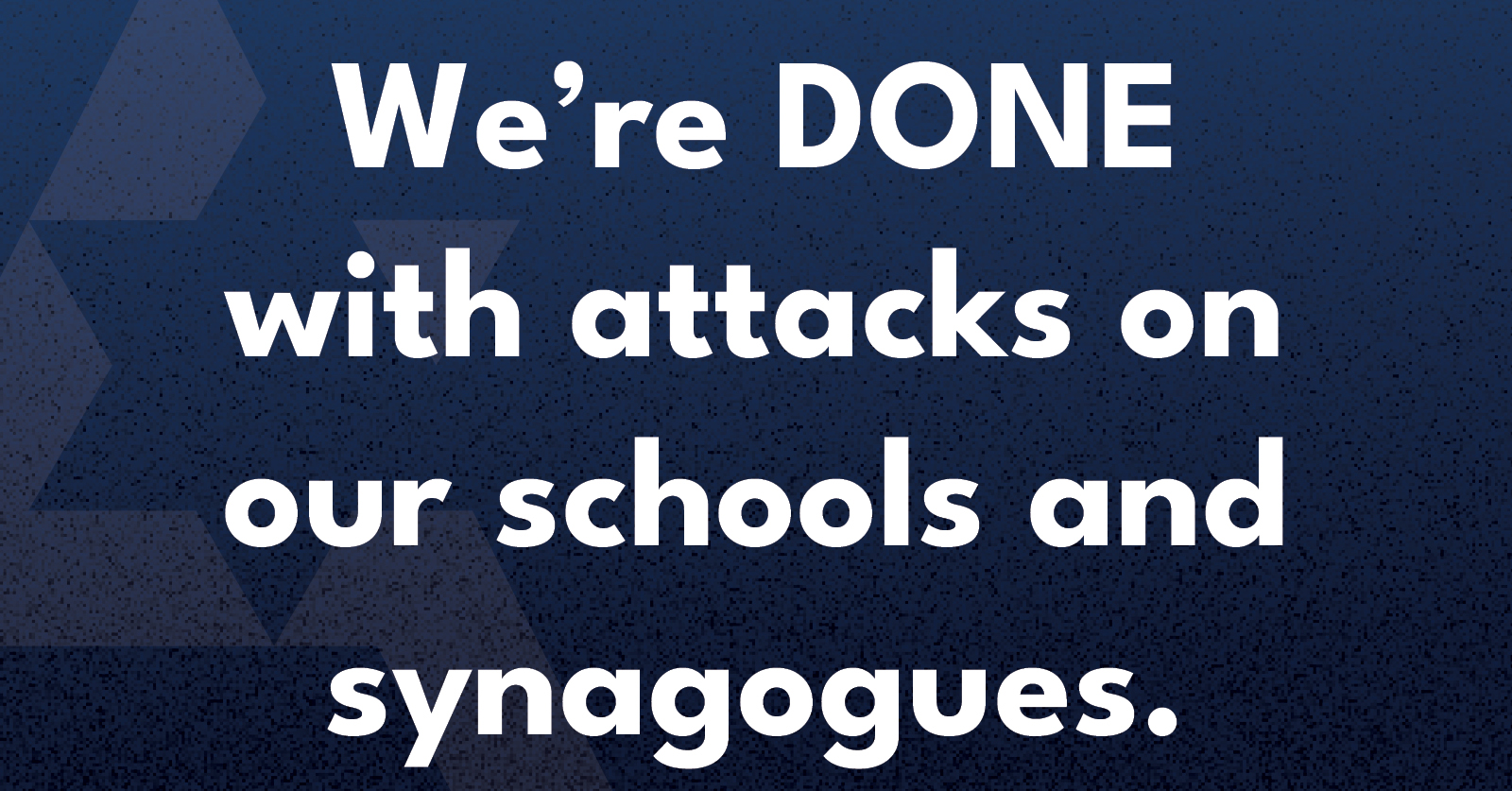Local News
Inaugural Magen David Adom fundraising gala evening recognizes generous donors Ida and the late Saul Alpern

By MYRON LOVE On Tuesday, May 7, the Winnipeg chapter of Canadian Magen David Adom (CMDA) hosted its first ever fundraising gala – billed as “A Night of Appreciation – honouring generous supporters Ida and the late Saul Alpern, as well as recognizing several other individuals who have contributed to the success of the local chapter.
The event helped to raise the profile of MDA in Winnipeg. In addition to funds raised – going towards the purchase by the Winnipeg chapter of CMDA of an ambulance to be stationed in the northern IsraeI community of Kiryat Shemona where a MDA ambulance was recently destroyed by a Hezbollah missile, the event also honoured the memory of the late Yoram (Hamizrachi) East.
Ami Bakerman, the Winnipeg chapter president, reported that, to date, the local group has raised slightly more than $100,000 toward the $140,000 cost of the ambulance.
Over 200 members of the Jewish and Christian communities and other supporters of Israel came out for the evening at Caboto Centre to show their appreciation for the work of the Magen David Adom.
For readers who may be unfamiliar with MDA, the organization doubles as both Israel’s Red Cross and the country’s blood services organization. MC for the evening Kinzey Posen noted that MDA was founded on June 7, 1930 and acquired its first ambulance a year later. The MDA has over 4,000 staff and has on its roster 26,000 volunteers. The organization operates over 2,000 ambulances, first responder scooters, helicopters and life-saving boats.
“It takes 8.2 seconds from the time a MDA dispatcher receives an emergency call to the time that the ambulance reaches the caller,” Posen noted.
The really remarkable fact is that the MDA operates without any financial support from the government of Israel. That is why it is so important that donors such as the Alperns have to step up.
Saul, who passed away in October, 2022, had a particularly strong connection to Israel. His younger brother, Avrum, also the last surviving family member (the others died in the Holocaust) died fighting for the Jewish homeland in the War of Liberation in 1948.
Alpern published his autobiography – “No One Waiting For me” – in 1961. Although most Romanian Jews living in Rumania proper were left in place, in 1941 the members of the Alpern family were among the thousands of Jews living in the northern regions of Bessarabia and northern Bukavina – which had been recently annexed by Rumania – who were deported to neighbouring Transnistria. They were expelled from their homes and forced to walk all the way to Transnistria. Saul Alpern’s parents and older sister died shortly after their arrival as a result of the hardships of the walk – leaving 12-year-old Saul and younger brother Avrum to fend for themselves.
“No One Waiting for Me” is largely an account of the two brothers’ struggle to survive in a hostile environment and desperate circumstances.\
After the war, while Avrum went to Palestine while Saul found his way to Winnipeg – where he eventually met and married Ida (Reiss) and built a successful business as a cattle buyer.
Ida was born in the Jewish farm colony at Edenbridge, Saskatchewan. She was youngest of four children and the own daughter of Ira and Raizel Reiss. The family moved to Winnipeg around 1950.
In October 2020, Ida and Saul donated $160,000 to the MDA to buy a mobile intensive care unit. At the time, Saul told The Jewish Post & News that the couple made the donation in memory of his parents and siblings ,who died in the Holocaust.
Saul added that the gift was “an expression of my love for my family and my love for Israel”.
The couple had been donating small amounts to the MDA for years before that. And, just a few months before Saul’s passing, the couple donated another $170,000 toward the purchase of a second mobile intensive care unit with off-road capabilities.
Speaking on behalf of the family, Ida’s nephew, Cary Reiss, recounted how Sail and Ida met in 1963 and were engaged after just a three-week courtship. “They were married for almost 60 years,” he noted. “They were a great couple. They were always there for each other through good times and bad.”
Reiss further noted that he was in Israel last year with his Aunt Ida for the delivery of the second mobile intensive care unit. He praised the MDA for the great work the organization does in Israel.
He also reminisced about the other focus of the evening, the late Israeli-born Winnipegger, Yoram East, who was a prominent social activist in the wider community.
In Ron East’s description of his father he painted a picture of man who was larger than life – and an individual who overcame early adversity.
Yoram was born in 1932 in Jerusalem to Jewish immigrants from Germany. He struggled in school due to being dyslexic. At 16. he dropped out of school and was accepted into the Israel Defense Forces based on false documents.
“In the IDF, he found a home and a purpose,” Ron East recounted.
He rose through the ranks. After taking a break from the military to study art and build a career as a journalist, Yoram rejoined the IDF in the 1970s. From 1976-82, Colonel Hamizrachi was the IDF liaison with the Christian communities in southern Lebanon.
“My dad quit the IDF in 1982, when Israel went to war with Hezbollah in Lebanon,” Ron East recalled. “He strongly opposed the war.”
Hamizrachi moved his family to Winnipeg where he continued to work as a journalist – with regular columns on Israel in The Jewish Post. He also became a social activist and did a lot of work with Indigenous communities.
“Two First Nations communities made him honorary chiefs,” Ron noted.
In Winnipeg, he helped found the Manitoba Intercultural Alliance and became the co-director of the Winnipeg-based Counter-Terrorism Centre.
In addition to honouring Ida and Saul Alpert, CMDA also recognized several other individuals who have contributed to the growth of the CMDA chapter in Winnipeg – among them:Ami Ba kerman, Ron East, donors Bill and Judy Mahon, Barbara Reiss (for organizing the event) and John Plantz who, along with colleague Roy Hiebert – presented a cheque to the CMDA for $10,000 from the Christian Friends of Israel Ministry.
There was much more to the evening. Sharon Fraiman, CMDA’s director for Western Canada, called for a moment of silence in memory of the MDA personnel who were murdered in the terrorist attack on Israel on October 7. She also screened several short videos of the actions of heroic MDA staff and their actions on that horrific day in fighting back as well as rescuing those tthey could.
There were also remarks by Sidney Benizri, CMDA national executive director, and Wayne Ewasko, PC MLA for Lac du Bonnet and interim Opposition leader.
The evening concluded with a half hour show by New York-based stand-up comic Talia Reiss – who happens to be married to the aforementioned Cary Reiss – riffing on Jewish themes contrasting Reform and Orthodox and Sephardi and Ashkenazi differences, reflecting the different backgrounds that she and her husband have brought to their relationship, as well as commentary on parenthood and schooling. For good measure, she also threw in some Winnipeg in-jokes.
Local News
Cheryl Hirsch Katz, Jewish Child and Family Service’s longest serving staffer, set to retire at end of the month

By MYRON LOVE “I loved working at Jewish Child and Family Service,” says Cheryl Hirsh Katz, who is due to retire at the end of June. “I have always appreciated the warm and welcoming atmosphere here. I feel that the people working here are my extended family. I am going to miss my colleagues”.
“I have derived great satisfaction over the years to have been able to help many people in our community of all ages through my work at JCFS,” she continues.
After 44 years at the agency, Katz, the longest-serving member of the staff, was given an appreciative send-off at the JCFS’s recent (June 23) Annual General Meeting at the Shaarey Zedek Synagogue.
The daughter of Art and Bess Hirsh, Cheryl grew up in Garden City. She attended Peretz School, then Jefferson Junior High and Garden City Collegiate. She joined the staff of JCFS in 1981, shortly after receiving her Bachelor of Social Work degree.
She earned an MSW in 1990.
“I chose to become a social worker,” she recalls, “because I always wanted to be able to help people.”
Katz was originally hired by JCFS to work with newcomers. After a couple of years, she was given responsibility for looking after the needs of older adults.
“I really enjoyed working in older adult services,” she says. “That is where I spent the bulk of my time at JCFS.”
After ten years as a case worker, she was promoted to a supervisory role. Later, she was also given responsibility for mental health and addictions programming and settlement services, while keeping the older adult files under her purview.
“As a supervisor, I wasn’t directly involved with individual clients,” she points out. “I was more involved with programming. Among the programs for seniors we organized were – for example – sessions on elder abuse, digital storytelling and memory loss.”
She notes that one of the trends she has seen over the last 44 years is that people are living longer and living in their homes longer. A lot more of our clients are living well into their 90s,” she observes. “We have had to continually expand our staff and the services we provide in order to accommodate the growing demands of an aging population.”
She also spoke of the mental health needs of seniors and aging Holocaust survivors.
She says that she has mixed feelings about leaving JCFS. “After so many years working full time, I am going to have to create a new routine,” she comments.
She notes that, now that she is retired, she will have more time to spend with her parents – who are in their 90s.
And then, there are the two dogs to look after. “I will have time now to try new activities,” she says. “ I might learn to play mah-jong.”
She speaks about maybe doing some traveling – although her husband, Murray, is still working full time.
(She and Murray have one daughter, Farah.)
“Retirement may also include some volunteering,” she adds.
It is quite likely, she will be continuing her association with JCFS but in a volunteer capacity.
Local News
Gray Academy students shine in provincial, national debating competitions

By MYRON LOVE It has been another good year for Gray Academy’s high school students who participated in provincial and national debating competitions. The best results were recorded by Grade 9 student Noa Mednikov, who finished fourth overall nationally, fourth in interpretive reading, and fifth in persuasive speaking at the junior National Public Speaking Championship in early May in Vancouver.
Last October, in the Junior Provincial British Parliamentary Championship – which was held at St. John’s-Ravenscourt – Noa and her partner, Raya Braunstein, finished third as a team while Raya placed third in individual debating.
Their fellow Grade 9 student Maxim Moscalenkov tied for first in persuasive speaking in Vancouver, while the Gray Academy team of Gabe Tapper and Aaron Koplovich finished fifth. Aaron also finished fifth in his individual debate.
Earlier, in March, Maxim finished fifth in the Provincial Juniors debating competition, which was held at Balmoral Hall He and his debate partner, Nate Shenkarow, finished seventh among the teams entered. Last November, he and partner, Ethan Tenenbein, finished seventh in the Junior Prepared Tournament – just behind the Gray Academy team of Nate Shenkarow and Jack Kay.
At the senior high level in that competition, the team of Jacob Tenenbein and Jonah Novoseller finished fourth and Jacob was recognized as fifth best in an individual capacity. Jonah and Jacob also paired up to win the Asper Cup, which was held at their home school.
Jacob represented Manitoba at the Junior National Speech Championship in Vancouver in May and, last October, he and Grade 12 Gray Academy students Julie Krozkin and Daniel Bokser represented Canada at an international debating tournament in Bermuda.
Gray Academy’s debating program was introduced by Linda Martin in 2003. She also led the debating teams at Balmoral Hall. In 2011, Martin was succeeded by Gray Academy high school English teacher Andrew Kaplan.
“Andrew has done a wonderful job with the debating program” says Martin, who has a debating trophy at Gray Academy named in her honour, as well as a provincial trophy for best individual junior debater. “Over the years, Gray Academy students have done very well in many local, national and international competitions,” she adds.
About three weeks ago, this writer had the opportunity to sit down with Andrew Kaplan and six of the school’s top debaters while they discussed the benefits of learning how to debate. According to Noah Strauss – who competed in the Junior Provincials at Balmoral Hall in March, public speaking leaves him with a feeling of accomplishment.
“It’s a good skill set to have,” he observes. “It builds confidence.”
“A benefit of being able to debate is that you learn how to convince people that you know what you are talking about,” adds Maxim Moscolenkov.
Raya Braunstein notes that being able to debate is a skill that she expects to be helpful in many university courses which she may choose to take.
As Andrew Kaplan notes, the ability to express yourself has a great impact in whatever career you choose to pursue.
He points out that debating is compulsory at Gray Academy for all Grade 7 and 8 students – and students can continue debating as an option in the higher grades
Of course, competitive debating is not for everyone. For those students who opt to take that path, the journey begins with internal school debate competition – with the top debating teams and individuals qualifying for local tournaments and – potentially – beyond.
Andrew Kaplan reports that a small number of high schools in Winnipeg and southern Manitoba have active debating programs – including St. Johns Ravenscourt, St. Paul’s High School, St. Mary’s Academy, Garden City and Maples Collegiates in the Seven Oaks School Division, St. Maurice (a Catholic School), as well as Morden Collegiate and Dasmesh, a Sikh private school.
Kaplan expresses his appreciation to the Asper Foundation and an endowment spearheaded by the Kives Family for providing funding for the Gray Academy debating program – as well as the Andrew Slough Foundation – which was established by his friends in memory of the outstanding former Ravenscourt student debater and lawyer who passed away suddenly two years ago at the still young age of 38.
I am confident that our Jewish community can look forward to the continued success of Gray Academy’s star debaters and to the continual emergence of future stars as the times goes by.
Local News
Antisemitism has crept into grade school in Canada

Antisemitism in Canada has moved beyond protests and politics; it is now entering classrooms and altering how Jewish children see themselves functioning within them.
A a university student I have observed the experience of my younger brother in grade eight as a Jewish student. Over the past few months, his school has been at the center of several deeply troubling incidents that have made him feel unsafe in our parks, community, and even his school. Swastikas were drawn around the community, in parks and ponds. Additionally, an older man, who claims to be a pro-Palestinian influencer, stood outside his predominantly Jewish school wearing a keffiyeh, filming a video which then circulated between students on TikTok.
This same man later showed up to our local Jewish community center in keffiyeh to allegedly watch his son play basketball where my brother and many of his classmates go for their lessons, basketball games, and Jewish events. These moments made him and his peers feel watched and targeted just for being Jewish. Local political representatives condemned the incidents and raised awareness about antisemitism, but the fear among students didn’t go away. The feeling of being targeted for simply existing has been taught to my brother, something my parents had tried their hardest to escape from.
Most recently, my brother was chosen to represent his school at a regional science fair. When one of the judges arrived wearing a keffiyeh, he froze. For many, including my brother after the incidents he has faced, the keffiyeh represents a political message. But even more so for my younger brother, it is tied to the fear and intimidation he had already experienced. He felt nervous, distracted, and unsure of how to act.
This is not about silencing political expression. It is about a child who came to share his ideas and left feeling uncertain and afraid. It is about the atmosphere forming in Canadian schools, where Jewish students are being made to feel targeted and unwelcome.
His school made an effort to address the incidents, but the impact is lasting. Posts on social media, much can be very vague at times about inclusion cannot fully undo the feeling of being singled out. A kind word from a teacher does not erase the fear that builds when threats are left unspoken but deeply felt.
I am writing this as a sister who watched her younger brother lose a moment that should have been filled with confidence and pride. He deserved to feel safe. So do all Jewish students in this country.
Moving forward, schools must take concrete steps to protect all students. Antisemitism cannot only be addressed when it becomes violent or overt. It must also be recognized when it appears as intimidation, symbolic targeting, or political messaging that creates fear among students. Children should never have to question whether they are safe in their own classrooms or community spaces.
Events that are meant to support and celebrate students must remain focused on them. Individuals who feel the need to bring political symbols or messages into school grounds or children’s events should not be welcomed in those spaces. Schools must make it clear that their environments exist to support learning, safety, and inclusion, not to host agendas that can intimidate or isolate students.
Administrators and educators must develop clear guidelines for identifying and responding to antisemitic behavior in all its forms. This includes strengthening security measures, offering ongoing staff training, and engaging directly with Jewish families to understand their concerns. Inclusion is not a one-time statement. It is a responsibility that must be reflected in everyday decisions and actions. No child should ever feel unsafe or unwelcome because of their identity.
The author is a Campus Media Fellow with HonestReporting Canada and Allied Voices for Israel who lives in Toronto.
